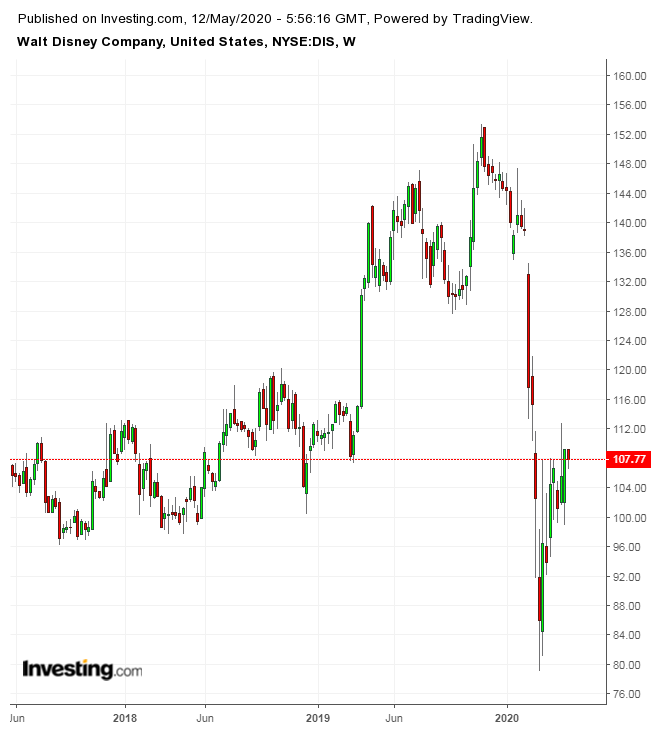The Walt Disney Company (NYSE:DIS) is in the middle of a nasty downturn. Its business, which thrives on shared group experiences, is suffering after the global spread of COVID-19 forced the closure of its theme parks, resorts, movie theaters and cruises around the world.
Hurt by this unprecedented challenge, the House of Mouse last week reported a $1.4-billion shortfall in its operating income for the last quarter, including a $1-billion hit coming from shuttered theme parks alone, and the rest from other business units.
But the worst is yet to come. The current quarter will be the one when Disney will face the full impact of closures of its entertainment assets, along with the shutdown of movie theaters and the loss of live sports on its flagship ESPN cable network. Analysts predict the company will lose hundreds of millions of dollars, with revenue plunging across the board.

Dealt this severe blow, Disney shares have lost a quarter of their value this year. They were down 1.27% to $107.77 as of yesterday's close.
Nonetheless, the entertainment giant has taken multiple measures to reduce the impact of events on its future earnings. It has temporarily laid off thousands of workers and announced reductions in executive pay. In a move to further preserve cash, the company said last week it will forgo its July dividend payment, saving about $1.6 billion, and cut capital spending by $900 million.
In this dismal situation, where the future is clouded with uncertainty, Disney investors are facing hard choices. Should they sell Disney shares, or stay faithful to the company which has a long history of recovering from recessions and wars?
On the Road To Recovery
The majority of analysts are quite hopeful about Disney's future. Among the 33 covering the stock, 22 give it a buy rating; there's one sell recommendation and 11 are advising holding the stock.
Since Disney owns some of the most iconic media and entertainment assets in its sector, chances are good the Burbank, California-based company will recover quickly once the pandemic is contained. Executive Chairman Robert Iger stressed this while speaking with analysts on a conference call last week, saying the company “will get through this,” crisis.
One bright spot in this otherwise gloomy outlook: the company's newly-launched Disney+ video streaming service. Boosted by stay-at-home orders, the service is expanding quickly. It's grabbed more than 56 million subscribers since its launch in November. Though still burning cash, Disney+ is in a strong growth mode and could become one of the company's major revenue-generating units in the post-pandemic world.
That said, Disney’s road to recovery will be slow and gradual as was evident from the reopening of its park in Shanghai yesterday where the Chinese Disneyland welcomed visitors for the first time since January. Local authorities gave permission for Shanghai Disneyland to reopen at 30% capacity, or roughly 24,000 people a day.
To reach the gates of Shanghai Disneyland, guests had to pass through body temperature checks and show that their health status has been confirmed using a smartphone app for tracking infected persons. Masks were mandatory, while some of the famous attractions were canceled, including parades, fireworks and meet-and-greets with familiar characters, according to a report in the Wall Street Journal.
Bottom Line
Disney stock has come back from March lows, showing that even during the worst of the pandemic investors haven’t lost hope in the company which owns some of the world's best entertainment assets under its umbrella.
At the same time, it’s obvious that Disney’s earnings won’t return to normal until there's a global cure available for the coronavirus. For long-term investors with a two-year or longer horizon, Disney stock remains a good bet.
